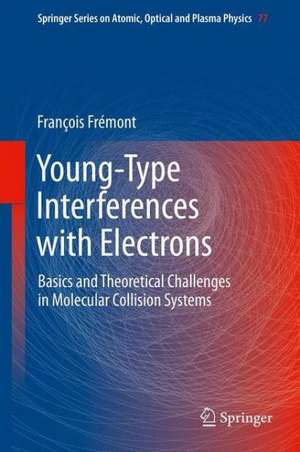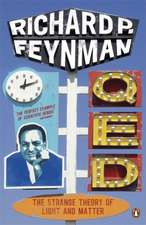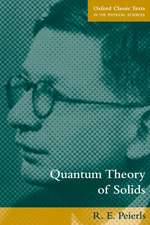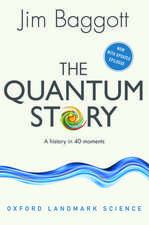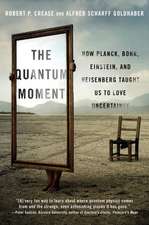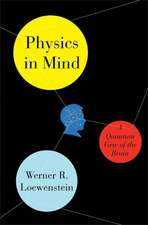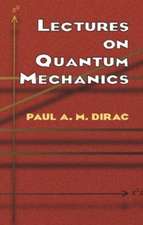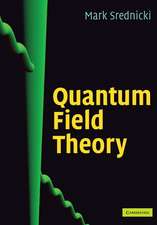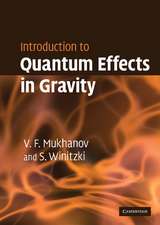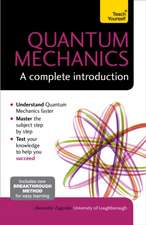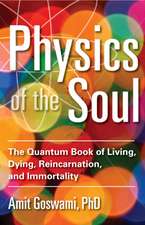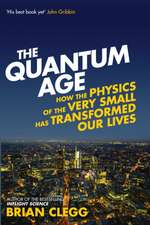Young-Type Interferences with Electrons: Basics and Theoretical Challenges in Molecular Collision Systems: Springer Series on Atomic, Optical, and Plasma Physics, cartea 77
Autor François Frémonten Limba Engleză Hardback – 28 oct 2013
| Toate formatele și edițiile | Preț | Express |
|---|---|---|
| Paperback (1) | 637.59 lei 6-8 săpt. | |
| Springer Berlin, Heidelberg – 25 feb 2016 | 637.59 lei 6-8 săpt. | |
| Hardback (1) | 642.51 lei 6-8 săpt. | |
| Springer Berlin, Heidelberg – 28 oct 2013 | 642.51 lei 6-8 săpt. |
Din seria Springer Series on Atomic, Optical, and Plasma Physics
- 18%
 Preț: 1007.65 lei
Preț: 1007.65 lei - 18%
 Preț: 942.63 lei
Preț: 942.63 lei - 24%
 Preț: 833.23 lei
Preț: 833.23 lei - 15%
 Preț: 641.20 lei
Preț: 641.20 lei -
 Preț: 384.86 lei
Preț: 384.86 lei - 24%
 Preț: 810.76 lei
Preț: 810.76 lei - 18%
 Preț: 786.04 lei
Preț: 786.04 lei - 18%
 Preț: 793.94 lei
Preț: 793.94 lei - 15%
 Preț: 649.54 lei
Preț: 649.54 lei - 18%
 Preț: 1023.11 lei
Preț: 1023.11 lei - 18%
 Preț: 1006.87 lei
Preț: 1006.87 lei - 18%
 Preț: 1117.03 lei
Preț: 1117.03 lei - 15%
 Preț: 642.36 lei
Preț: 642.36 lei - 18%
 Preț: 998.82 lei
Preț: 998.82 lei - 18%
 Preț: 781.77 lei
Preț: 781.77 lei -
 Preț: 382.75 lei
Preț: 382.75 lei - 15%
 Preț: 650.37 lei
Preț: 650.37 lei - 18%
 Preț: 792.03 lei
Preț: 792.03 lei - 24%
 Preț: 975.66 lei
Preț: 975.66 lei - 24%
 Preț: 790.67 lei
Preț: 790.67 lei - 18%
 Preț: 945.79 lei
Preț: 945.79 lei - 18%
 Preț: 999.76 lei
Preț: 999.76 lei - 18%
 Preț: 883.90 lei
Preț: 883.90 lei - 18%
 Preț: 784.92 lei
Preț: 784.92 lei - 18%
 Preț: 1006.06 lei
Preț: 1006.06 lei - 18%
 Preț: 882.19 lei
Preț: 882.19 lei - 18%
 Preț: 955.88 lei
Preț: 955.88 lei - 18%
 Preț: 748.77 lei
Preț: 748.77 lei - 18%
 Preț: 1015.23 lei
Preț: 1015.23 lei - 15%
 Preț: 582.12 lei
Preț: 582.12 lei -
 Preț: 390.25 lei
Preț: 390.25 lei -
 Preț: 389.49 lei
Preț: 389.49 lei - 18%
 Preț: 945.79 lei
Preț: 945.79 lei -
 Preț: 384.48 lei
Preț: 384.48 lei
Preț: 642.51 lei
Preț vechi: 755.88 lei
-15% Nou
Puncte Express: 964
Preț estimativ în valută:
122.95€ • 131.47$ • 102.51£
122.95€ • 131.47$ • 102.51£
Carte tipărită la comandă
Livrare economică 17 aprilie-01 mai
Preluare comenzi: 021 569.72.76
Specificații
ISBN-13: 9783642384783
ISBN-10: 3642384781
Pagini: 300
Ilustrații: XI, 227 p.
Dimensiuni: 155 x 235 x 22 mm
Greutate: 0.48 kg
Ediția:2014
Editura: Springer Berlin, Heidelberg
Colecția Springer
Seria Springer Series on Atomic, Optical, and Plasma Physics
Locul publicării:Berlin, Heidelberg, Germany
ISBN-10: 3642384781
Pagini: 300
Ilustrații: XI, 227 p.
Dimensiuni: 155 x 235 x 22 mm
Greutate: 0.48 kg
Ediția:2014
Editura: Springer Berlin, Heidelberg
Colecția Springer
Seria Springer Series on Atomic, Optical, and Plasma Physics
Locul publicării:Berlin, Heidelberg, Germany
Public țintă
ResearchCuprins
Photon Interferences: History and Fundamental Aspects.- Interferences with Massive Particles.- Electron Interferences Using Macroscopic and Nanoscopic Interferometers.- Young-Type Electron Interferences Using Single Electron Sources.- A Theoretical Description of Young-Type Interferences Following Auger Electron Emission.- Conclusions and Perspectives.
Notă biografică
François Frémont and Jean-Yves Chesnel are both teachers in Physics at the University of Caen and researchers at CIMAP (Centre de Recherche sur les Ions, les Matériaux et la Photonique) in Caen (France). Their research field concerns ion-atom and ion-molecule collisions. Presently, they mainly focus their effort on electron interference phenomena at the atomic scale.
Raúl O. Barrachina is Head of the Department of Interaction of Radiation with Matter at the Bariloche Atomic Centre and Professor at the Balseiro Institute, Argentina, of which he was director from 2003 to 2006. His area of research is theoretical atomic and molecular physics, with special interest in atomic collisions. He is a fellow of the Institute of Physics (GB).
Raúl O. Barrachina is Head of the Department of Interaction of Radiation with Matter at the Bariloche Atomic Centre and Professor at the Balseiro Institute, Argentina, of which he was director from 2003 to 2006. His area of research is theoretical atomic and molecular physics, with special interest in atomic collisions. He is a fellow of the Institute of Physics (GB).
Textul de pe ultima copertă
Since the discovery that atomic-size particles can be described as waves, many interference experiments have been realized with electrons to demonstrate their wave behavior. In this book, after describing the different steps that led to the present knowledge, we focus on the strong link existing between photon and electron interferences, highlighting the similarities and the differences. For example, the atomic centers of a hydrogen molecule are used to mimic the slits in the Young's famous interference experiment with light. We show, however, that the basic time-dependent ionization theories that describe these Young-type electron interferences are not able to reproduce the experiment. This crucial point remains a real challenge for theoreticians in atomic collision physics.
Caracteristici
First modern treatment of this topic after Debye's classic book of 1931 Starts at an elementary level suitable for undergraduates but also addresses interesting research problems Profits from the authors' deep knowledge and expertise in atom interferometry Includes supplementary material: sn.pub/extras
